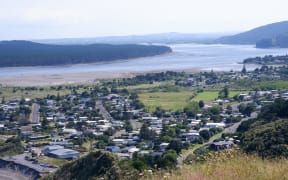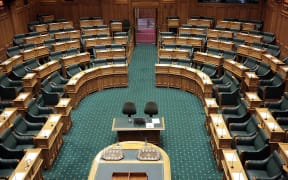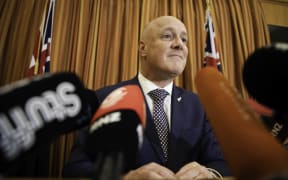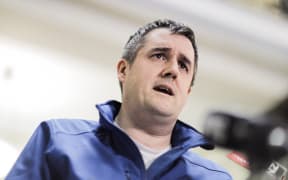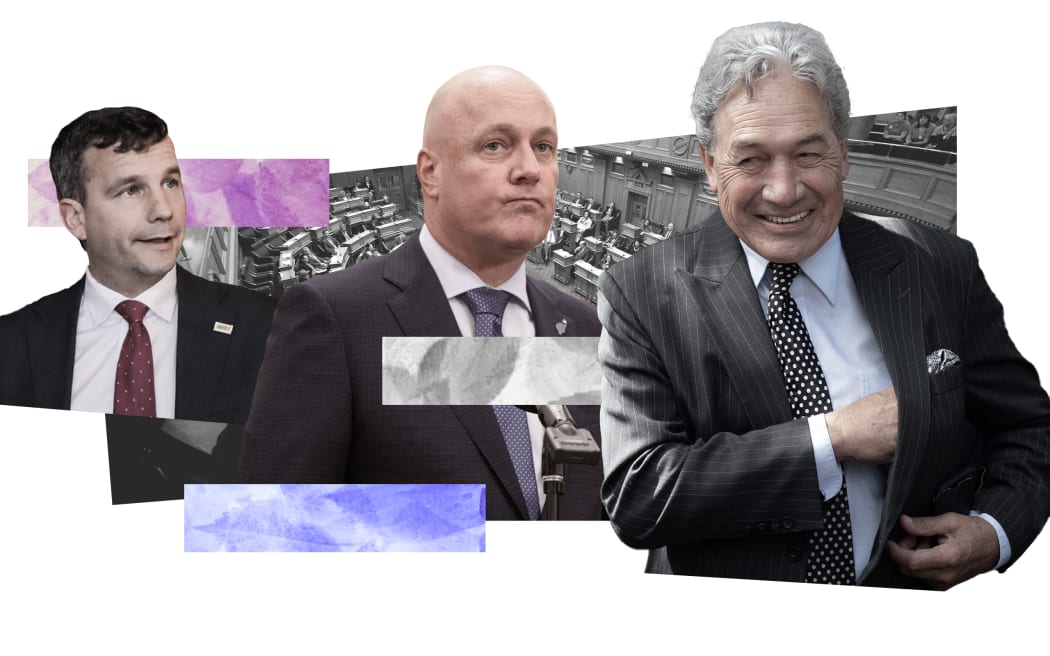
The final 2023 election results were announced on 3 November, and have changed the allocation of seats - leaving National leader Christopher Luxon with a new playing field to form a government on. Photo: RNZ
Analysis: Final election results mean Christopher Luxon must reach an agreement with Winston Peters before he can form a government.
After that his first task will be to appoint a cabinet and he's given indications of who will get some of the top jobs.
Labour leader Chris Hipkins will face a caucus meeting where his future will be decided, and "camp Chippy" is reported to be confident he will hold onto the position.
Amid all the details of the final election results only one thing really mattered - National and ACT don't have a majority and Christopher Luxon has to strike a deal with Winston Peters before he can form a government.
It wasn't what he wanted. Luxon has said many times his preference was a "strong and stable" National/ACT government.
Before special votes had been counted that was achievable, although with a single seat majority.
Final results robbed him of it because National lost two seats, giving National and ACT a combined 59 seats and needing 62 to hold a majority in a Parliament which now numbers 122 MPs.
And it will be 123 MPs after the Port Waikato by-election on 25 November, which National is expected to win.
So NZ First's eight seats are now an absolute necessity for Luxon.
An agreement between National and ACT isn't expected to be difficult, the groundwork has been laid for that, but NZ First is another matter.
Luxon and Peters have held at least one meeting, but the contact is believed to have been more of a "getting to know you" exercise and the hard work is still to be done.
Just how hard that turns out to be largely depends on Peters.
He hasn't given anything away since the election, although his comment that he thought an agreement could be reached relatively quickly could indicate he doesn't see any serious sticking points.
"I think it can be done much more quickly than people think," he told Sean Plunket on The Platform.
It appears Peters is keeping his distance from ACT.
"To date, NZ First and ACT have not spoken," Stuff's political editor Luke Malpass reported shortly before final results were announced.
"NZ First sources say they won't talk to ACT, while ACT's attempts to engage with NZ First have been ignored."
That is typical of Peters. During previous government formation talks he has only dealt with the major parties and has ignored other minor coalition partners.
At his press conference after the release of the final results Luxon wasn't giving anything away.
There was good will and good faith on all sides, he would form a government as quickly as possible and the leaders of ACT and NZ First also wanted that, he said.
Questions about policies were met with "I'm not getting into that" and he wouldn't say whether he wanted a full coalition with the others or confidence and supply agreements.
Luxon said he would like to go to the APEC summit in 10 days but wouldn't set a deadline for forming his government.
All the final results are on RNZ's website, and there are some stunning outcomes. Te Pāti Māori picked up two more electorate seats including that of Labour's deputy leader Kelvin Davis.
When agreement on the shape of the government has been reached, Luxon's next task will be putting his cabinet together.
His latest position on that was only two roles were locked in - his own as prime minister and his deputy Nicola Willis as finance minister.
He has to say he hasn't made decisions on the other portfolios because he doesn't know what ACT and NZ First are going to want, and until he does he won't be able to appoint any of his own MPs.
He has, however, given very clear indications of who will get some of the important portfolios and Stuff collected some quotes on that.
Health is a big one. Shane Reti, the former Northland GP, has been National's health spokesman since July 2020. He has been very critical of the state of the health service.
In mid-September Luxon told reporters: "Shane Reti, he's gonna make an outstanding health minister, no doubt about it. Who else would you want doing that job?"
And who else would want it? No junior coalition partner party is known to have ever sought it, it's not known as the graveyard portfolio for nothing.
Mark Mitchell must be a sure thing for police minister. He's been police spokesperson since December 2021 and announced strong policies on gangs during the campaign. He also announced the boot camp policy for young offenders.
"We have a great member on our team, Mark Mitchell," Luxon said, also in mid-September. "He's a bravery award police officer. He'll make a fantastic minister of police and corrections."
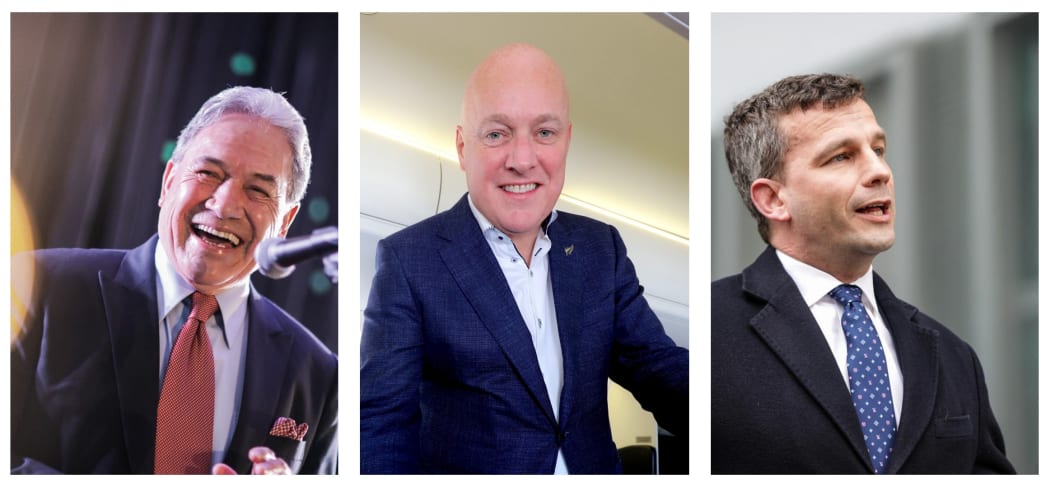
From left, the leaders of New Zealand First, the National Party and ACT: Winston Peters, Christopher Luxon, David Seymour. Photo: RNZ collage
Luxon intends creating three new roles - he's going to have a minister for mental health, a minister for space and a minister for hunting and fishing.
Matt Doocey has been mental health and suicide prevention spokesperson since January 2021.
Last year Luxon said Doocey would be the inaugural minister for mental health. He's a former counsellor and mental health worker.
"We'll have a dedicated minister for mental health, which will be Matt Doocey, who will focus on mental health and suicide prevention," Luxon said.
He also said Doocey would be a cabinet minister, not a junior minister outside cabinet.
He hasn't talked about the other two new roles. They're not likely to be lead portfolios such as Doocey's and could be allocated to other ministers as secondary responsibilities.
Other MPs almost certain to be given high-ranking positions include Chris Bishop, the housing and infrastructure spokesperson; Erica Stanford who has education; Gerry Brownlee who handles foreign affairs and Simeon Brown, transport.
Although Luxon has locked in Willis as finance minister, he hasn't said she will be deputy prime minister. That's because David Seymour or Winston Peters might demand the job.
Neither has given any indication that they want it. Seymour has said he wants to be minister for regulation so he can get to work cutting red tape.
The Herald's Audrey Young said Willis should definitely be deputy prime minister and explained why in an article headed "Nicola Willis is the clear pick for deputy prime minister after Winston Peters' meltdown and David Seymour's tax dig".
Young said both would have a claim to the position but both would be problematic, for different reasons.
"Peters, who showed relative constraint, discipline and good humour throughout his election campaign, has snapped," she said.
"His tweet suggesting the inquest into the 2019 mosque massacre had revealed secrets previously withheld by Jacinda Ardern was pure conspiracy.
"And instead of accepting he was wrong when presented with the evidence, he became more inventive in his conspiracy."
Young said that was the big worry - "less the error itself, but the inability and unwillingness to recover from it".
Seymour would be less of a worry for Luxon as deputy PM, but his "free-wheeling comments in the media suggest that he may be too free a political spirit to speak for the government rather than for ACT".
Young said Seymour had not followed Luxon's example of steering clear of policy discussions.
"He suggested that National's promise of tax cuts might not happen for another three years, which is not exactly the way to win friends," she said.
Columnist Matthew Hooton, writing in the Herald, did not think Peters should hold office at all in the new government.
"I believe Winston Peters has gone too far for any decent person to want him serving in government," Hooton said.
"If there is not some other explanation for his late-night tweets then he is, in my view, at best a moral cretin or, worse, used the terrible events of March 15 to make some kind of short-term tactical point in coalition negotiations even while knowing that doing so is wrong."
Chris Hipkins, still prime minister and leader of the Labour Party, has been almost invisible this week.
He did the routine interviews with radio and television, telling Newshub he was still "pretty passionate" about politics and the Labour Party.
As for his own future, he said he was sure colleagues were speaking to each other and the caucus would get together after final results were known.
When it does, there will be either a vote of confidence in Hipkins to continue as leader, unopposed, or there will be a challenger.
Stuff's Tova O'Brien said a caucus meeting was scheduled for next Tuesday, 7 November.
"Camp Chippy is feeling pretty confident that their guy has the numbers to retain the leadership of the Labour Party and there's a desire to call for a vote to cement Chris Hipkins' dominance as soon as reasonably possible," O'Brien said.
The party went through the same process after the last election, which is required by its constitution, and Jacinda Ardern was uncontested and unanimously confirmed as leader.
O'Brien said it would not be so easy this time.
"Some in the caucus are grumbling, angry with Hipkins for prioritising centrist 'bread and butter' policies at the expense of Labour Party 'bread and butter' ideology," she said.
"But talk of David Parker moving against Hipkins isn't being treated as a particularly serious threat by those in camp Chippy."
Under Labour's rules, as current leader Hipkins needs 60 percent of caucus, plus one additional vote, to back him. That means 21 of the 34 MPs.
It's harder for a challenger, who needs 66 percent support from the caucus.
Candidates need 10 percent of the caucus to nominate them as challenger.
* Peter Wilson is a life member of Parliament's press gallery, spent 22 years as NZPA's political editor and seven as parliamentary bureau chief for NZ Newswire.

